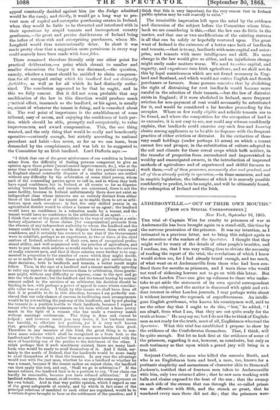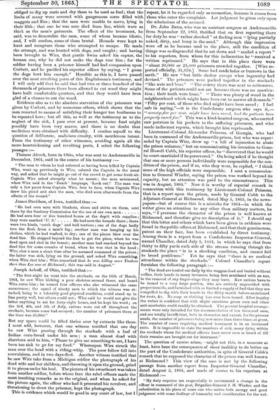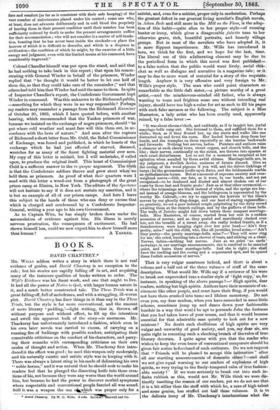New York, September 16, 1865. Tan trial of• Captain Wirz
for cruelty to prisoners of war at Andersonville has been brought again to a stand-still, this time by the nervous prostration of the prisoner. It was my intention, as I intimated in a previous letter, not to bring this subject again to the attention of the readers of the Spectator. I thought that they might well be weary of the details of other people's troubles, and I confess, too, that I was very willing thus to obviate the necessity of reading the report of the trial, the revelations of which I knew would sicken me, for I bad already heard enough, and too much, of what went on at Andersonville from those who had been con- fined there for months as prisoners, and I warn those who would not read of sickening horrors not to go on with this letter. But when the London Times can give up columns to those who under- take to set aside the statement of its own special correspondent upon this subject, and the matter is discussed with spirit and evi- dent interest in other London journals, I may perhaps write about it without incurring the reproach of superfluousness. An intelli- gent English gentleman, who knows his countrymen well, said to me the other day that I ought to do this, " but," he added, "I am afraid, from what I see, that they are not quite ready for the truth at home." He may say so; but I do not like to think of English- men as not ready for the truth, most of all, Englishmen who read the Spectator. What this trial has established I propose to show by the evidence of the Confederates themselves. That, I think, will be quite enough. But let us look first at the evidence of some of the prisoners, regarding it not, however, as conclusive, but only as such testimony as that upon which a grand jury will bring in a true bill.
Serjeant Corbett, the man who killed the assassin Booth, and who is an Englishman born and bred, a man, too, known for a puritanic simplicity and earnestness of character akin to Stonewall Jackson's, testified that of fourteen men taken to Andersonville with him, only two returned alive ; that he saw men working with balls and chains exposed to the heat of the sun ; that the swamp on each aide of the stream that ran through the so-called prison was so offensive with filth, and the stench so great, that be wondered every man there did not die ; that the prisoners were, "The first night he went into the stockade, on the 16th of March, 1864, he saw Wirz kicking a poor skeleton around there, and heard Wirz curse him ; he named four officers who also witnessed the same occurrence ; the squad of ninety men to which the witness was at- tached, being in a tolerably good physical condition, could stand up in line pretty well, but others could not ; Wirz said he would not give the latter anything to eat for forty-eight hours, and he kept his word ; on the 3rd, 4tb, and 5th of July, rations were cut off throughout the stockade, because some bad escaped; the number of prisoners there at the time was 35,000."
But my space could be filled thrice over by extracts like these. I must add, however, that one witness testified that one day he saw Wirz passing through the stockade with a loaf of Indian corn-bread under his arm ; a man almost dead with diarrhoea said to him, " Please to give me something to eat, I have been too sick to go for my food." Whereupon Wirz struck the man over the head with a riding-whip. The poor fellow fell into convulsions, and in two days died. Another witness testified that he saw Wirz take from a Michigan soldier the photograph of his dead wife and her children, and throwing it upon the ground, grind it to pieces under his heel. The picture of his sweetheart was taken from another soldier, before whose face the rebel officers made the most insulting remarks as to the original, and when he asked for the picture again, the officer who had it presented his revolver, and threatening to shoot the prisoner, kept the photograph.
This is evidence which would be good in any court of law, but I obliged to dig up roots and dry them to be used as fuel; that the limbs of many were covered with gangrenous sores filled with maggots and flies ; that the men were unable to move, lying in their filth ; that one he was sure died from lice, which were as thick as the man's garments. The effect of the treatment, he said, was to demoralize the men, some of whom became idiotic, and, I will confess, some of them brutal. Hounds were kept to hunt and recapture those who attempted to escape. He made
the attempt, and was hunted with dogs, and caught ; and having been brought to Wirz, that gentle Swiss asked his captor, the human one, why he did not make the dogs tear him ; for the soldier having been a prisoner himself had had compassion upon Corbett, and he pacified his superior officer by saying, " I guess the dogs hurt him enough." Horrible as this is, I have passed over the most revolting parts of this Englishman's testimony, and I will only add that he said that had two or three hundred of the thousands of prisoners there been allowed to cut wood they might have built comfortable quarters, and that they would have been glad of a chance to cut the wood.
Evidence also as to the absolute starvation of the prisoners was given by Corbett, and by numerous others, which shows that the men resorted to means of satisfying their hunger too loathsome to be repeated here; but all this, as well as the testimony as to the neglect of the sick, I pass over at present, because food might possibly have been very scarce, and there is no doubt that medicines were obtained with difficulty. I confine myself to the question of deliberate, malicious cruelty, with murderous intent. From the testimony of other witnesses, avoiding again all the more heartsickening and revolting parts, I select the following passages :—
Thomas Alcock, born in Ohio, who was sent to Andersonville in December, 1864, said in the course of his testimony :-
" The man to whom he had referred as having been killed by Captain Wirz, went up previously to Wirz, saluted the Captain in the usual way, and asked that ho might go out of the crowd to get some fresh air. Captain Wirz asked abruptly what ho meant ; the man murmured, when Wirz said in the Dutch ' language, 'Look out!' The man was only a few paces from Captain Wirz, face to face, when Captain Wirz drew his pistol and shot the man, who died soon afterwards from the effects of the wound."
James Davidson, of Iowa, testified thus :— " He had soon men with blankets, shoes and shirts on them, sent
there by the Sanitary Commission for the use of our own men He had seen four or five hundred boxes at the dep5t with supplies ;
they were marked 'U. S.' He had seen the hounds there ; there were two kinds, 'catch dogs' and bull terriers ; one of the dogs badly tore the flesh from a man's leg ; another man was hanging up his clothes, which he had washed, to dry; one of the pieces blew over the dead line. He stepped beyond the line to get the piece, when he was fired upon and shot in the breast; another man had reached beyond the dead line for some crumbs of broad, when ho was shot in the head ; Wirz shot a man a short time after he assumed command of the prison; the latter was sick, lying on the ground, and asked Wirz something, when Wirz shot him ; Wirz remarked that he was killing more Yankees there than Lee was at Richmond; this was said in August."
Joseph Achuff, of Ohio, testified that :— repeat, let it be regarded only as accusation, because it comes from those who enter the complaint. Let judgment be given only upon the admissions of the accused.
Dr. John Bates, who was an assistant-surgeon at Andersonville from September 22, 1864, tbstified that on first reporting there for duty he was " rather shocked " at finding men " lying partially naked, dirty, and lousy in the sand." Although this impression wore off as he became used to the place, still the condition of things was so disgraceful that he sat down and " mailed a report " to his superiors, from whom for this indiscretion he " received written reprimand." He says that in this place there were " about 20,000 or 25,000 prisoners crowded together. [Win re- ported officially, 31,678.] Some had made holes or burrows in the earth." He saw "but little shelter except what ingenuity had devised." The prisoners were packed together in the stockade "like ants and bees." "The scurvy there was next to rottenness. Some of the patients could not eat because there was no mastica- tion ; their teeth were loose." " There was plenty of wood in the neighbourhood which might have been cut to answer all demands." "Fifty per cent. of those who died might have been saved ; I feel safe in saying,"—it is the Confederate surgeon who says it,— " seventy-five per cent. might have been saved, had the patients been properly cared for." This was a kind-hearted surgeon, who carried raw potatoes in his pockets to the suffering prisoners, and who made indiscreet reports, which brought him reprimands.
Lieutenant-Colonel Alexander Peissons, of Georgia, who had been in command of the Andersonville prison, but who was super: ceded by Captain Wirz, drew up " a bill of injunction to abate the prison nuisance," but on communicating his intention to Gene- ral Howell Cobb, his superior officer, he " discovered that he would be court-martialed if he persevered." On being asked if he thought that one or more persons individually were responsible for the con- dition of the prison, and if so, who they were, he replied, " I think some of the high officials were responsible. I sent a communica- tion to General Winder, saying the prison was worked beyond its capacity, but no attention was paid to the remonstrance. This was in August, 1864." Now it is worthy of especial remark in connection with this testimony by Lieutenant-Colonel Peissons, that in a report upon the prison, made by General Cobb to the Adjutant-General at Richmond, dated May 5, 1865, in the news- papers—but of course this is a mistake for 1864—in which the writer gives no attention to any other than military matters, he says, " I presume the character of the prison is well known at Richmond, and therefore give no description of it." I should say that this letter and others which have been given in evidence were found in the public offices at Richmond, and that their genuineness, patent on their face, has been established by direct testimony. Among them is a report from a Confederate Inspector-General, named Chandler, dated July 5, 1864, in which he says that from thirty to fifty yards each side of the stream running through the stockade the place " is in a shocking condition, and cannot fail to breed pestilence." Yet he says that "there is no medical attendance within the stockade." Colonel Chandler's report furnishes the following paragraph :-
" The dead are hauled out daily by the waggon-load and buried without coffins, their hands in many instances being first mutilated with an axe, in the removal of any finger-rings they may have. Raw rations have to be issued to a very large portion, who are entirely nnprovided with proper utensils, and furnished with so limited a supply of fuel that they are compelled to dig with their hands in the filthy marsh before-mentioned for roots, dte. No soap or clothing has ever boon issued. After inquiry the writer is confident that with slight exertions green corn and other anti-scorbutics could readily be obtained. The present hospital arrange- ments were only intended for the accommodation of ten thousand men, and are totally insufficient, both in character and extent, for the present needs, the number of prisoners being now more than three times as groat. Tho number of cases requiring medical treatment is in an increased ratio. It is impossible to state the numbers of sick, many dying within the stockade whom the medical officers have never soon or hoard of till their remains are brought out for interment."
The question of course arises,- -might not this, in a measure at least, have been the consequence of sheer inability to do better on the part of the Confederate authorities, in spite of General Cobb's remark that he supposed the character of theprisou was well known at Richmond ? This view of the case is met by the following passage from another report from Inspector-General Chandler, dated August 5, 1864, and made of course to his superiors at Richmond :— " duty requires me respectfully to recommend a change in the officer in command of the post, Brigadier-General J. H. Winder, and the substitution in his place of some one who unites both energy and good judgment with some feelings of humanity and consideration for the wel-
fare and comfort (so far as is consistent with their safe keeping) of the vast number of unfortunates placed under his control; some one who, at least, does not advocate deliberately and in cold blood the propriety of leaving them in their present condition until their number has been sufficiently reduced by death to make the present arrangements suffice for their accommodation ; who will not consider it a matter of self-lauda- tion, boasting that he has never been inside the stockade—a place the horrors of which it is difficult to describe, and which is a disgrace to civilization—the condition of which he might, by the exercise of a little energy and judgment, even with the limited means at his command, have considerably improved."
Colonel Chandler himself was put upon the stand, and said that he had nothing to take back in this report ; that upon his remon- strating with General Winder in behalf of the prisoners, Winder replied that "he thought it would be better to let one half of them die, so that they could take care of the remainder ;" and that others had told him that Winder had said the same to them. In spite of Inspector Chandler's report, the Confederate Government kept Winder in command. Was this unknown to the Richmond public, —something for which they were in no way responsible? Perhaps my readers may remember a passage from the Richmond Examiner of October 30, 1863, which I have quoted before, with another bearing, which recommended that the Yankee prisoners of war, because we insisted on the exchange of negro prisoners, should " be put where cold weather and scant fare will thin them out, in ac- cordance with the laws of nature." And soon after the capture of Richmond a short letter from Mr. Ould, the Rebel Commissioner of Exchange, was found and published, in which he boasts of the exchange which he had just effected of starved, diseased, wretches for as many of the finest fighting material ever seen. My copy of this letter is mislaid, but I will undertake, if called upon, to produce the original itself. This boast of Commissioner Ould is a suffieent answer to the to quoque argument. The truth is that the Confederate soldiers throve and grew stout when. we held them as prisoners. As proof of what their quarters were 1 send with this letter a wood-cut from a photograph of the great prison camp at Elmira, in New York. The editors of the Spectator will not hesitate to say if it does not sustain my assertion, and it is but an example of all of our prison camps. And here I leave this subject in the hands of those who can deny or excuse that which is charged and condemned by a Confederate Inspector- General, writing a year ago to his own Government.
As to Captain Wirz, he has simply broken down under the accumulation of evidence against him. His illness is merely nervous prostration, the consequence of excitement. He had shown himself less, could we now expect him to show himself more
































 Previous page
Previous page